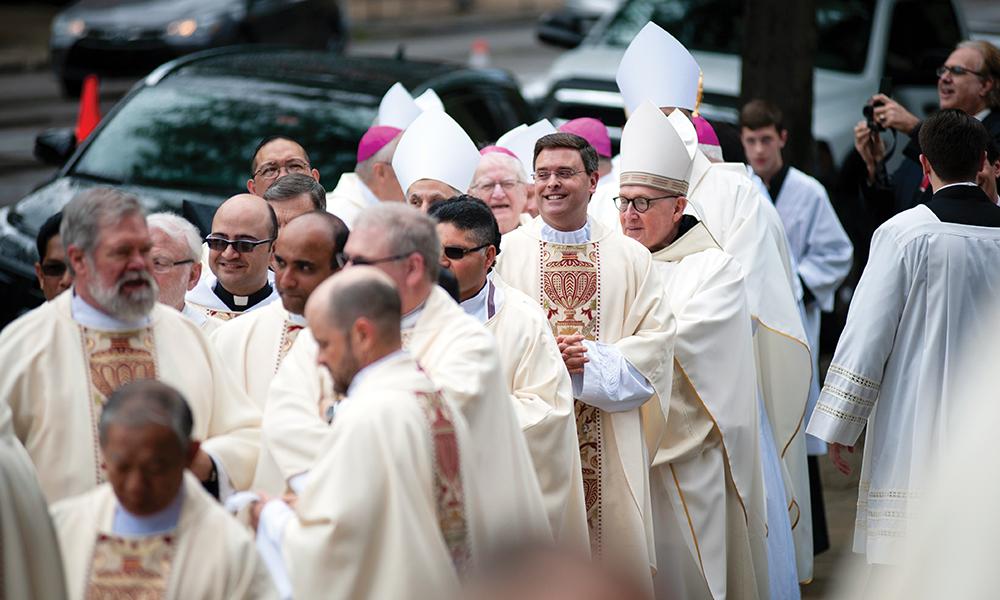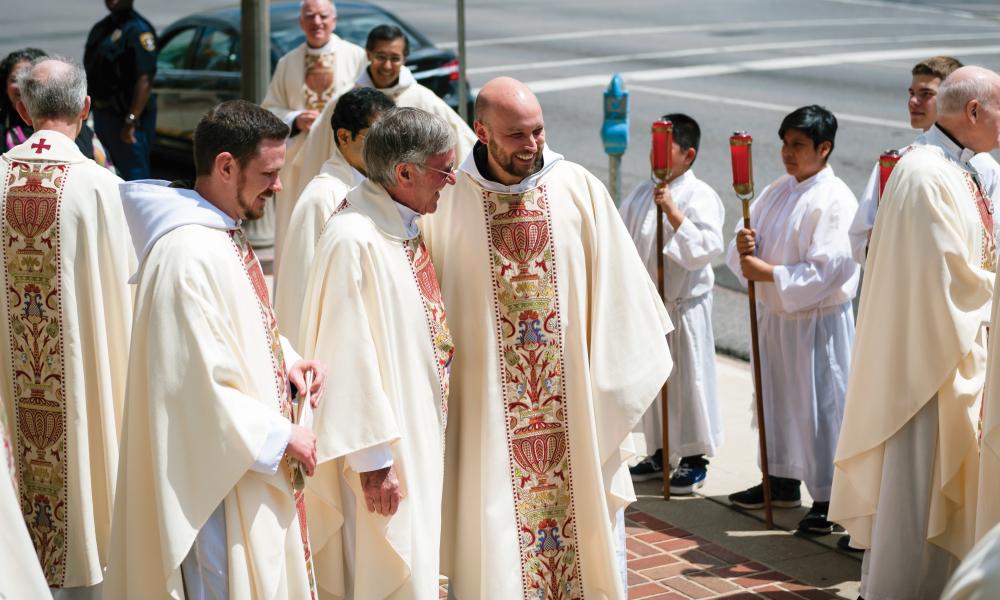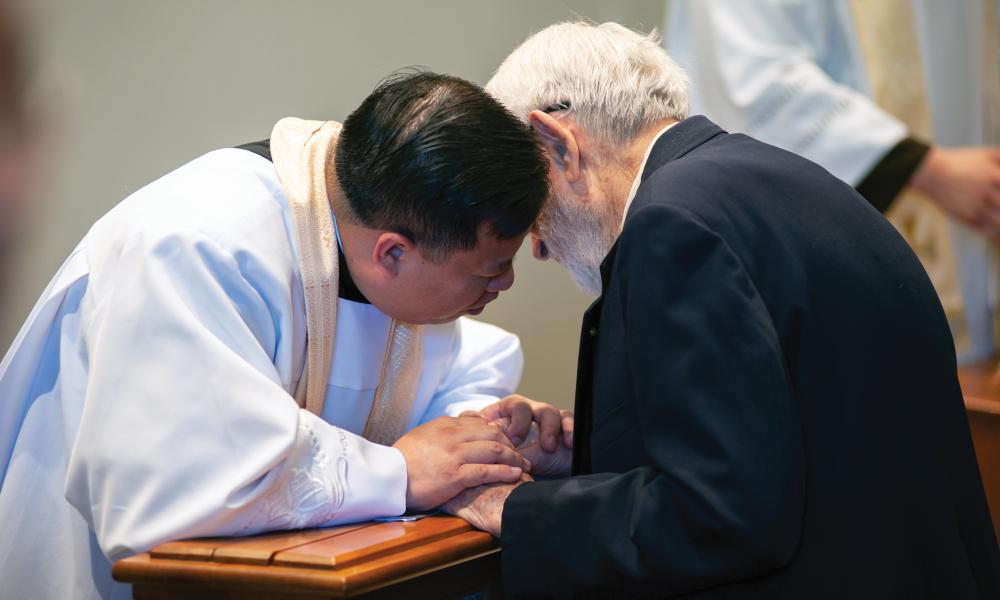
Closeness
Sometimes, people ask me what the priesthood is like. The short answer is “Jesus.” Typically, however, people want a lengthier description. I think that Pope Francis, in his address to the International Theological Symposium on the Priesthood in February, gave us a little snapshot of the vocation of priesthood. He described four essential traits of the priest: closeness to God, to the bishop, to other priests, and to people. In my own short time as a priest, I recognize the importance of these traits. I have also noticed that as seminarians grow in their understanding of priesthood, they begin, with the help of grace, to intuitively develop these traits.
Sometimes, people ask me what the priesthood is like. The short answer is “Jesus.” Typically, however, people want a lengthier description. I think that Pope Francis, in his address to the International Theological Symposium on the Priesthood in February, gave us a little snapshot of the vocation of priesthood. He described four essential traits of the priest: closeness to God, to the bishop, to other priests, and to people. In my own short time as a priest, I recognize the importance of these traits. I have also noticed that as seminarians grow in their understanding of priesthood, they begin, with the help of grace, to intuitively develop these traits.
Pope Francis describes each trait within the context of “closeness,” which suggests the familiarity and affection of a personal relationship. Ultimately, these traits are founded on charity, the essence of every vocation. It’s no surprise then that he begins with closeness to God. He notes that priests need daily contact with Jesus and His Word. When we spend time prayerfully reading Scripture, we are able to measure our life against the life of Christ. Negative situations such as ingratitude and conflict can challenge our priesthood, but contact with Scripture reminds us that Jesus experienced the same. He also experienced wedding feasts and healings. Daily contact with the life of Christ in Scripture often reignites the Spirit within us.
In seminary, our priest formators reminded us often that we cannot give what we do not have. Seminarians know this, but maintaining consistency in the spiritual life can be a challenge in the often rigorous and vagabond life of a seminarian. In my brief time as vocations director, I have noticed that seminarians make daily prayer a priority in their lives. Seminary teaches them over and over the importance of closeness to God, which they all seek to deepen.
Pope Francis describes the next essential trait as “closeness to the bishop.” Frequently, we characterize the relationship between bishop and priest as “obedience.” At ordination, priests do promise obedience to the bishop. Closeness, however, suggests that even “obedience” is established firmly in charity. Pope Francis describes obedience as a sign of deep communion. Closeness with the bishop keeps priests united with the Church. It keeps us listening to others in order to discern God’s will together, and it prevents us from becoming too closed off within ourselves, living more as “bachelors” than as priests.
When I began in the Vocations Office, I looked for opportunities to foster the relationship between the seminarians and the bishop. A healthy relationship helps them and the bishop to better discern the will of God. In seminary, discernment continues within the communion of the Church, especially with the bishop. As Pope Francis notes, “The bishop … remains for each priest and for every particular Church a bond that helps discern the will of God.”
Based on a closeness with the bishop, priests foster the third essential trait, “closeness to other priests.” Men usually bond over shared adversity. Many priests rely on the friendships they forged within the challenges of seminary. Based on a common experience, priests hold one another accountable, empathize, and encourage as the situation requires. Envy and detraction poison a presbyterate, but closeness to other priests acts as an effective antidote. Given the geographic distance of the diocese, priests have to be intentional about fostering fraternity. It requires time and effort, but it is vital to a healthy priesthood.
The current and most recent generations of seminarians have a strong desire for priestly fraternity. They learn quickly in seminary that they cannot do it all by themselves. Competition naturally arises within the seminary, but a genuine fraternal charity keeps the competition from becoming destructive. Rather, the competition becomes a source of encouragement and accountability from other men striving for holiness.
Closeness to other priests reinforces the fourth essential trait, “closeness to people.” Many priests, like myself, enjoy their own company. At times, being social requires a great effort, but being with other people centered on Jesus Christ often kindles our potential for charity. Pope Francis described this closeness as a grace for priests, not merely a duty. He wrote, “Loving others is a spiritual force, drawing us to union with God.” It is in giving of ourselves for the good of another that we go deeper into union with God. In this, we access the divine life of Christ.
In vocations work I have noticed that seminarians often foster this closeness to people on their own initiative. By and large, seminarians are greeted with enthusiasm and encouragement from God’s people. They are well aware, however, of the suspicion that greets them from many outside the Church and from some corners within. Because of this, not in spite of it, many of them feel motivated to bring the love of Christ into all of those areas of pain and hurt. They want to help, but they also know that the people have only one Savior, Jesus Christ.
These essential traits of “closeness” define how priests relate to God, the Church, each other, and God’s people. At the heart of all four is charity, which forms the foundation of any vocation. After all, each one of us is called to the same vocation, the universal call to holiness. This vocation finds its ultimate fulfillment in the closeness of charity.
Father Wyman Vintson is administrator of St. Elizabeth Ann Seton Catholic Church in Gardendale and St. Henry Catholic Church in Warrior. He also serves as the Vocations Director for the diocese.




